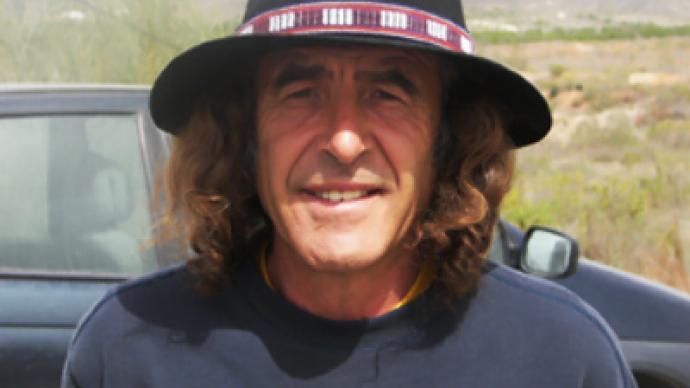It’s a cushy ole life for a British gypsy!

Love them or loathe them, travelers in Britain are thriving, lapping up laws there to be exploited. With their population increasing dramatically, gypsies in the UK cannot be ignored.
“People live well beyond their means and that is the problem with modern day society”, says Phil, a 61-year-old ingrained traveler, or gypsy as he prefers to be known.
Phil has lived at the edge of a forest not far from the town of York in the North of England for 11 years. He has never owned a house, never owned a car, never had a bank account, has four children and five grandchildren and is extremely happy and fulfilled. Phil has always lived on “gypsy” camps and wholeheartedly embraced the way of life his parent’s grew him used to. With his weathered face, toothless grin, faded bandana and slim physique, Phil is every bit the character he looks and it is easy to understand why he is well-loved and admired within the gypsy horde. Preferring to live “simply and peacefully” rather than “conforming to normality”, Phil talked about how ever much they try to live quietly, the life of a traveler, through public fallacy and the despise that accompanies it, is regularly disrupted and made difficult.
“We are completely self-sufficient here and we always have been. We grow our own food, make our own clothes, educate our children and make our own entertainment. I have never relied on any outside help, although by the abuse and degradation we have always received, you would think we were asking the earth.”
Phil has been moved on by authorities a total of 39 times in his life. Although he and his family have always suffered scowls, scorn and sacrilege from complete strangers, he would not change his life for the world and with today’s worries he is even more relieved he steered clear of “the system”. Phil said:
“Society has made its bed and now it is lying in it. How long could it sustain people living off credit and buying houses six times their salaries? We travelers are living proof that with a little proficiency a fulfilling live can be achieved with next to nothing.”
Whilst others world’s are crumbling around them, Britain’s “travelers’” lives are changing, for the better. Fields, unused farmland and other derelict terrain cramped with washing lines, pets, toilets and caravans has become a very common sight since the government introduced the Human Rights Act. As many as 3,680 illegal travelers’ camps are currently present in the UK, causing many challengers to surface from the woodwork and political opposition to rebuke the current law.
When the Human Rights Act was introduced in 1999 there were as few as 300 illegal traveler sites in Britain. This number steadily increased to four times that amount, but since January this year traveler settlements have reached unprecedented levels as those exempt from “conventional” society cotton on to loopholes in the system. Savvy travelers are buying exceptionally cheap land and settling there, building “temporary” toilets and sewerage without planning permission and then disputing any challenges or threats of eviction as an infringement of rights.
Since February this year, 41-year-old Isabella has been living with a group of travelers on a site outside an affluent town in Cheshire. Isabella has not always been a traveler but chose the life ten years ago following a series of bust-ups with “conformist” society. Isabella arrived with her adopted family in style, being chased by an angry ex-husband, an irate landlord and a fuming policeman and in doing so immediately won the admiration of the other travelers and became an overnight gypsy “sensation”. Isabella is delighted that new laws in Britain mean that travelers are becoming better catered for.
“Just because we don’t own ‘bricks and mortar’ does not mean we should be devoid of any civil liberties. You always find one ‘do-gooder’ in an area who thinks they are above the law. But rules are rules and for once we are being considered,” she said.
Antagonism towards the less “conventional” in society is not a trait confined to Great Britain. “Crab” Casamicha has lived and traveled around on an old English bus for 12 years with his wife and four daughters. Choosing to park the bus indefinitely on Spanish soil, Crab was sentenced to a short spell in a Spanish jail for caring to mention on a local radio station that the town’s mayor had been allowing open sewerage to run through a site where several travellers, including children were temporarily living.
With an English father, a Spanish mother, a carefree smile bounded by a hat and a Bob Dylan semblance, Crab’s appearance suits that of a worldly traveller devoid of any “steadiness” or “normality”. Perhaps his three months in jail would not have been enforced on a “proper” citizen dressed in a tie, suit and shiny shoes. His stint inside for “defamation of character” earned Crab much respect amongst the locals and he has since been regarded as something of a local hero. When asked why they called him Crab, he replied in a softly spoken voice with a trace of Cockney mixed with an Andalusian undertone:
“When I was 17 I joined the army and they took me on my initiation when I was in Hong Kong. I got so drunk that I started walking sideways and henceforth I was christened Crab. My career in the army may not have survived but the nickname they gave me certainly has.”
Joel’s story however is not quite so epic, and is testimony to why many of the more conservative persuasion are challenging the regulations in Britain that have allowed the numbers of traveller settlements to become extraordinary high. Back in the mid-seventies after a fall out with “the Missus”, Joel found himself jobless, homeless and penniless, with little alternative than to join an official gypsy camp on an industrial estate in Exeter. On returning to the camp, after a day spent scrabbling around for scrap to sell, Joel found his caravan “mashed to pieces” by his fellow “companions”, who were convinced they would earn a fast couple of quid. Joel said:
“Anyone who is misled into believing gypsies have simple, carefree and even romantic lives are deeply mistaken. They are complete scoundrels, absolute animals. If you’re family they’ll protect you. If you’re not they’d have the coat off your back to make a penny!”
Describing his six months living at the gypsy site as “complete carnage”, Joel believes the British government has blundered by applying a law that encourages travellers to thrive and grow. He said:
“If the Prime Minister had seen what I have seen he wouldn’t be as quick to employ a Human Rights Law that gives rights to people who are qualified in deceit and dishonesty.”
Whilst feuds between these divergent groups of people have always been a common occurrence in the UK, the new laws that have been implemented have appeared to have caused deeper disputes and grievances as the gap between classes grows larger. Whilst travelers may complain that they are devoid of civil liberties, one thing is for sure; their camps are certainly never devoid of a character or two.
Gabrielle Pickard for RT















